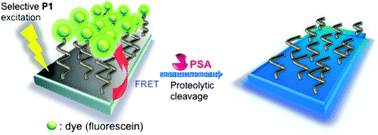A conjugated polymer–peptide hybrid system for prostate-specific antigen (PSA) detection†
Abstract
We developed fast and readily applicable microarray chips to detect PSA by designing a novel

* Corresponding authors
a Materials Science and Engineering, University of Michigan, Ann Arbor, USA
b Chemical Engineering, University of Michigan, Ann Arbor, USA
c Biomedical Engineering, University of Michigan, Ann Arbor, USA
d
Macromolecular Science and Engineering, University of Michigan, Ann Arbor, USA
E-mail:
jinsang@umich.edu
We developed fast and readily applicable microarray chips to detect PSA by designing a novel

 Please wait while we load your content...
Something went wrong. Try again?
Please wait while we load your content...
Something went wrong. Try again?
K. Lee, S. Mandal, J. Morry, O. Srivannavit, E. Gulari and J. Kim, Chem. Commun., 2013, 49, 4528 DOI: 10.1039/C3CC00280B
To request permission to reproduce material from this article, please go to the Copyright Clearance Center request page.
If you are an author contributing to an RSC publication, you do not need to request permission provided correct acknowledgement is given.
If you are the author of this article, you do not need to request permission to reproduce figures and diagrams provided correct acknowledgement is given. If you want to reproduce the whole article in a third-party publication (excluding your thesis/dissertation for which permission is not required) please go to the Copyright Clearance Center request page.
Read more about how to correctly acknowledge RSC content.
 Fetching data from CrossRef.
Fetching data from CrossRef.
This may take some time to load.
Loading related content
